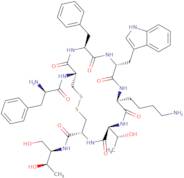Octreotide
CAS : 83150-76-9
Ref. 3D-IDA15076
| 1mg | Arrêté | ||
| 5mg | Arrêté | ||
| 10mg | Arrêté | ||
| 25mg | Arrêté | ||
| 50mg | Arrêté | ||
| 0.01g | Arrêté | ||
| 100mg | Arrêté | ||
| 250mg | Arrêté | ||
| 0.025g | Arrêté |
Informations sur le produit
- L-cysteinamide, D-phenylalanyl-L-cysteinyl-L-phenylalanyl-D-tryptophyl-L-lysyl-L-threonyl-N-(2-hydroxy-1-(hydroxymethyl) propyl)-cyclic (2->7)-disulfide, (R-(R*,R*))
- OctreotideAcetate
- 10-(4-aminobutyl)-16-benzyl-N-[(2R,3R)-1,3-dihydroxybutan-2-yl]-7-(1-hydroxyethyl)-13-(1H-indol-3-ylmethyl)-6,9,12,15,18-pentaoxo-19-(phenylalanylamino)-1,2-dithia-5,8,11,14,17-pentaazacycloicosane-4-carboxamide acetate (1:2)
- (4R,7S,10S,13R,16S,19R)-10-(4-aminobutyl)-16-benzyl-N-[(2R,3R)-1,3-dihydroxybutan-2-yl]-7-[(1R)-1-hydroxyethyl]-13-(1H-indol-3-ylmethyl)-6,9,12,15,18-pentaoxo-19-(D-phenylalanylamino)-1,2-dithia-5,8,11,14,17-pentaazacycloicosane-4-carboxamide
- (4R,7S,10S,13R,16S,19R)-10-(4-aminobutyl)-16-benzyl-N-[(2R,3R)-1,3-dihydroxybutan-2-yl]-7-(1-hydroxyethyl)-13-(1H-indol-3-ylmethyl)-6,9,12,15,18-pentaoxo-19-(D-phenylalanylamino)-1,2-dithia-5,8,11,14,17-pentaazacycloicosane-4-carboxamide
- 1: PN: EP1118336 SEQID: 1 claimed protein
- 11: PN: US20030229017 PAGE: 13 claimed protein
- 14: PN: DE10147056 PAGE: 40 claimed protein
- 17: PN: US6268342 SEQID: 18 claimed protein
- 25: PN: WO2007081792 SEQID: 40 claimed protein
- Voir d'autres synonymes
- L-Cysteinamide, D-phenylalanyl-L-cysteinyl-L-phenylalanyl-D-tryptophyl-L-lysyl-L-threonyl-N-[(1R,2R)-2-hydroxy-1-(hydroxymethyl)propyl]-, cyclic (2→7)-disulfide
- Longastatin
- Sms 201-995
Octreotide is a drug that is used to treat carcinoid syndrome, a condition characterized by excessive production of hormones and neurotransmitters such as serotonin. It works by inhibiting the release of these substances from the cells in the body. Octreotide also has been shown to have some effect on somatostatin receptors, which are found in the hypothalamus and brain. This drug binds to these receptors and inhibits the release of growth hormone, prolactin, and other hormones. Octreotide has also been shown to be effective against bowel disease in experimental models. Octreotide can cause adverse effects such as nausea, vomiting, diarrhea, headache, injection site reactions (e.g., pain), and skin reactions (e.g., rash).





